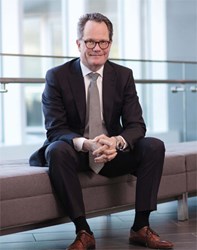Tips On Transitioning To The Role Of Expatriate

From The February 2016 Issue
Novo Nordisk Turns Adversity Into Opportunity
In Jesper Høiland’s 25 years with Novo Nordisk, the president of the company’s U.S. business unit admits to having visited more than 90 countries. Although not all of these involved him having to uproot his family, some did. “In the last 25 years, I’ve been moved 13 times,” attests the subject of Life Science Leader magazine’s February 2016 cover feature. “It’s exciting to see new places.” And though he says his spouse has gotten used to packing up the house for the eight countries they have called home, it hasn’t always easy. “My wife has more education than I have,” he explains. “When we were first starting out she also had a better job.” According to Høiland, every time they decided to move to a new country his spouse seized the opportunity to increase her education. “Then as soon as she was ready to apply for a job, we were moving on to the next country,” he shares. “That has been a big challenge for us.”
Holding up three fingers Høiland says, “The advice I give to every person considering working abroad or in another environment is that they have to address these three things. First, how does it work for the family? Second, ask yourself if you can do the job. Third, what’s in it for the company?” Høiland continues, “Many people claim I’ve been living in the most luxurious places on earth – Toronto, Princeton, Sydney, Paris, and it’s hard to find the hardship in that. But of course there is a hardship.” For example, when the Høilands first embarked on their life journey together, they didn’t have any children. “We had one on the way. Eventually we had one in Canada and one in Belgium,” he says. “Finding the fit with your family requires a lot of discussions as to what’s in it for them. Though my wife and I feel we are in this together, before any move we must first agree that this is something exciting that we both want to do.” His advice is to start very early in your career of being open to moving around. “Then it becomes a part of your lifestyle,” he states.
When weighing your ability to do a job or how taking an international relocation will benefit the company, Høiland says to imagine yourself as a rubber band. “In any new job that you’re thrown into there will be a place from which you will have to expand from,” he explains. “Taking different positions throughout the world and at different times in your life gives you the agility necessary to stretch yourself beyond what you thought you were capable of.” Høiland says he has never departed a position where upon leaving it wasn’t able to be made into two jobs. “That doesn’t mean that I can do two people’s jobs,” he clarifies. “It means that things have expanded, which is a positive for myself, but even more so for the company.”
Mobility is an item high on Høiland’s leadership agenda. “People are much less willing to travel around the world and do the job for the company,” he attests. To help people better understand the nuances of working as an expatriate requires a personal approach. “I like to meet with colleagues and discuss with them what it will take to be successful in a move to Europe, Denmark, Southeast Asia, or wherever it is that we’re having jobs opening up,” he explains. During these conversations, it often becomes apparent that many people don’t understand why they should take the job. “Many use children as an excuse for why they can’t take the position,” he states. “As an expatriate and a father, I realize that finding fit with family is one of the hardest things you will have to do,” he states. “But to be more effective as leaders and help people understand the full potential of an opportunity means bringing employees in early so they can serve as a sounding board.” Dialogue needs to go beyond explaining that being a future leader necessitates having a willingness to move around the world. For example, having held a number of international positions helped Høiland build his global network. “When we lost the ESI [Express Scripts] business [exclusion of Victoza and NovoRapid from the PBM’s formulary] just as I was starting in the U.S., I knew most of the people and what they were doing,” he says. “As a result, it didn’t take long to pull the team together to address this crisis.” Although Høiland admits there have been a couple of occasions where he has turned down a move, he is also quick to point out how his children have benefitted from being exposed to a variety of different cultures and experience, such as learning to read, write, and speak Danish, and attending university in the states. According to Høiland, helping employees understand the benefits of an international assignment requires leaders to engage early and in dialogue beyond just what’s in it for the company.
